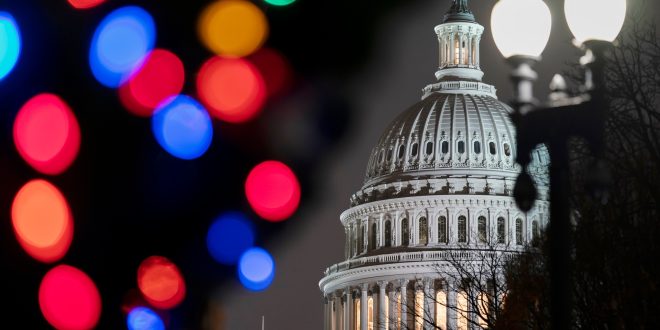The United States House of Representatives has voted once more to pass the Respect for Marriage Act, a bill that would enshrine federal protections for same-sex and interracial marriages.
An earlier version of the bill first passed the House in July, in a surprise bipartisan vote that brought 47 Republicans together with the Democratic majority for an overall vote of 267 to 157.
Thursday’s vote likewise saw bipartisan support. The Respect for Marriage Act passed 258 to 169, with 39 Republicans joining a unanimous Democratic front.
The bill now heads to Democratic President Joe Biden, who is expected to sign it into law. The vote comes as Democrats are set to lose their majority in the House, following November’s midterm elections.
The Respect for Marriage Act is a landmark piece of legislation that would prevent states from denying “out-of-state marriages on the basis of sex, race, ethnicity or national origin”. It also “repeals and replaces” existing federal law that defines marriage as being between individuals of the opposite sex.
Such laws are already unenforceable, following Supreme Court decisions like 2015’s Obergefell v Hodges, which guaranteed the right for same-sex couples to marry.
But House Democrats advanced the Respect for Marriage Act this past summer in the wake of the Supreme Court’s controversial decision in Dobbs v Jackson Women’s Health Organization. That decision overturned nearly a half-century of court precedent in denying the federal right to abortions in the US, giving the states powers to regulate access to reproductive rights.
An opinion in that case written by conservative Justice Clarence Thomas suggested that the Supreme Court should “reconsider all of this Court’s substantive due process precedents”, naming the Obergefell decision among them.
New York Representative Hakeem Jeffries, who is slated to take the top Democratic position in the House in January, took aim at Justice Thomas and the conservative-leaning Supreme Court in his remarks ahead of Thursday’s vote.
Quoting the Declaration of Independence – “We hold these truths to be self-evident, that all men are created equal” – Jeffries pointed out that that ideal wasn’t applied to everyone equally across history.
“Certainly it didn’t apply to the LGBTQ community. But through a process of constitutional amendment, ratification, court decision and legislation, those words have increasingly been brought to life as we journey towards a more perfect union,” Jeffries said.
“That is the work that is being done today with the Respect for Marriage Act, particularly because of a radical, right-wing, reckless and regressive Supreme Court majority that threatens freedom and marriage equality.”
Ohio Republican Jim Jordan, meanwhile, dismissed Democrats’ concerns that Supreme Court precedents like Obergefell and Loving v Virginia – which upheld interracial marriage in 1967 – could be overturned.
“Democrats have conjured up this nonexistent threat, based on one line in Justice Thomas’s concurrence in Dobbs. And they are misunderstanding or deliberately misrepresenting what Justice Thomas wrote,” he told the House.
House Republicans also took the podium to denounce the Respect for Marriage Act as an attack on religious freedom. Virginia Representative Bob Good said he rose “in strong opposition” to the bill, calling it disrespectful.
“The fact is, traditional biblical marriage is the foundation of a strong society and a strong culture. I’ll say it once again: Almost everything that plagues our society is a failure to follow God’s design for marriage, morality and the family,” Good said.
He warned that the bill would “ensure that the marriage laws in the most liberal state, irrespective of how radical they might become in the future – think polygamy, bestiality, child marriage or whatever – must be legally recognised in all states”.
The Respect for Marriage Act explicitly prohibits polygamy. It also includes a number of Republican amendments to recognise and protect religious freedom, including language to ensure that its contents are not used to target or deny government benefits, like tax-exempt status, based on religious beliefs.
After adding guarantees to ensure that religious organisations could not be sued under its language, the Respect for Marriage Act passed the US Senate with bipartisan support in November, with a vote of 61 to 36.

Several prominent religious organisations have also stated their support for the bill, including the Church of Jesus Christ of Latter-day Saints (LDS), also known as the Mormon church.
In November, it issued a press release that said the church was “grateful for the continuing efforts of those who work to ensure the Respect for Marriage Act includes appropriate religious freedom protections while respecting the law and preserving the rights of our LGBTQ brothers and sisters”.
New York Democrat Jerry Nadler, who sponsored the Respect for Marriage Act, underscored this point on Thursday, telling the House that, “contrary to the fears expressed about religious liberty, almost every church group in the United States has endorsed this bill”.
The Respect for Marriage Act has a narrow mandate. It would not codify the Supreme Court’s Obergefell decision. Should the Supreme Court ever reverse its decisions allowing same-sex and interracial marriage, the bill would not prevent states from blocking such unions.
But the act would repeal laws like 1996’s Defense of Marriage Act, which limited the definition of marriage to be “between a man and a woman” for the purposes of federal recognition and benefits. It also bars states from rejecting the validity of marriages performed in other states based on factors like race, sex and ethnicity.
In her remarks before Thursday’s vote, Democratic House Speaker Nancy Pelosi framed the Respect for Marriage Act as a bulwark against “right-wing extremists”.
“Since the Supremes Court’s monstrous decision overturning Roe v Wade, right-wing forces have set their sights on this basic personal freedom,” Pelosi said, citing her work on behalf of marriage equality.
“Today, we will include marriage equality into federal law now and for generations.”
The Supreme Court heard arguments on Wednesday in the case of a Colorado website designer seeking an exemption from the state’s anti-discrimination law, on the grounds that it violates her religious freedom to refuse services to same-sex couples.
 Top Naija News – Nigeria News, Nigerian News & Top Stories Top Naija News – Nigerian Newspapers, Nigerian News. topnaijanews is a daily Nigerian newspaper covering Latest News, Breaking News, Entertainment, Sports, Lifestyle and Politics.
Top Naija News – Nigeria News, Nigerian News & Top Stories Top Naija News – Nigerian Newspapers, Nigerian News. topnaijanews is a daily Nigerian newspaper covering Latest News, Breaking News, Entertainment, Sports, Lifestyle and Politics.




